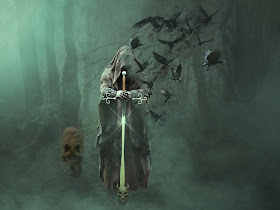 |
| I cast lightning bolt! And... turn into a swarm? Cool, I guess. |
The major problem with this mechanic is it has at DM discretion written right into it. So if you have a DM who considers PC abilities to be a player concern, then you might never end up rolling on the table that is sort of a key component of this particular sorcerous origin. Alternatively, if you have a DM who makes you roll every time, then it can feel like you're being punished for trying to use your abilities (especially if you roll as many 1s as I do). Or, thirdly, you have a DM who will make you roll when they remember. While that is really random, I'd argue that random isn't the same thing as being wild.
My suggestion is to find the method in your madness.
What Triggers Your Wild Talent?
The whole idea behind wild magic seems to be that it's uncontrollable, and that it will do what it wants, when it wants. That added element of randomness can be fun. But my suggestion is to sit down with your DM, and to decide on the triggers that will make your particular wild magic surge at any given time.
Or, at least, factors that will make it more likely to surge.
 |
| And like all triggers, they're subject to change and character growth. |
As an example, say your character was a soldier before being exposed to weapons-grade magic that instilled (or woke up) a wild magic talent. The character maintains control through discipline, grit, and sheer, dogged determination. As such, casting spells when he can take his time, or when he's calm and focused, he's fine. If he's emotionally distressed, wounded, or his control otherwise slips, that's when the surges start getting away from him.
The trigger for when you need to roll for a surge could be almost anything, as long as it plays into your character's story, and your campaign's themes. The surges might come when your character casts while angry, making them a kind of magical version of the Hulk. They might only show up when you use certain kinds of spells (attack spells, defense spells, spells of a certain school, etc.). The surges might only come when you cast your spells at night, or only during the day. They might be a result of casting while drunk (we've all had that sorcerer at our table before), or using too many spells too close together (your control overheats when you cast more than three spells in a row, for example).
There's no real limit on possibilities, and you don't have to use just one trigger. Get creative with it, and see what happens!
Doesn't This Take Power Away From The DM?
Not really, given that you have to work with your DM for this method to even apply to your character. The goal here is to take one more task off the DM's plate, and to make it more of a collaborative element between the two of you.
Also, there's nothing stopping the DM from randomly having you roll for a surge at a dramatically-appropriate moment. This just helps you, as a player, to remind your DM that your sorcerer's talent seems to be set off in certain circumstances. That way you can participate in your own character's weirdness, without feeling like you're entirely subject to arbitrary DM calls for you to potentially drop a fireball on your own head.
Also, for more fun with this class, you might want to read 5 Tips For Playing Better Sorcerers!
That's all for this week's Crunch post. If you'd like more posts from me, check out my Vocal archive, or head over to the YouTube channel Dungeon Keeper Radio where I help out from time to time. To stay on top of all my latest releases, follow me on Facebook, Tumblr, and Twitter. Lastly, if you'd like to help support Improved Initiative, then either Buy Me A Ko-Fi or drop some change into The Literary Mercenary's Patreon. A little help goes a long way!
No comments:
Post a Comment